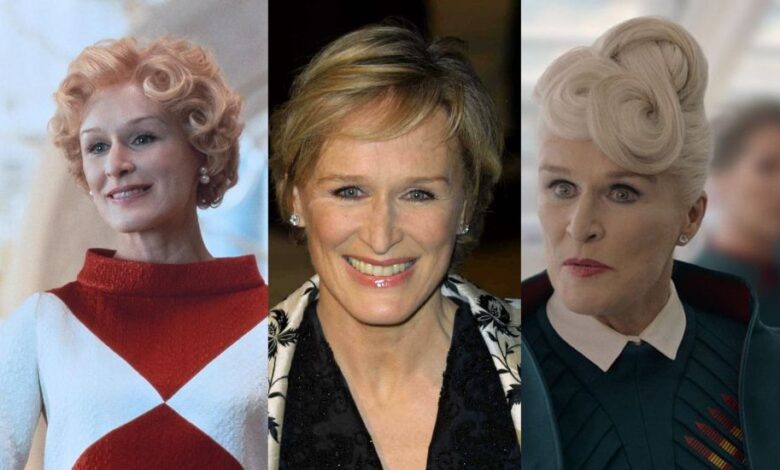Glenn Close: A Lifetime of Brilliance, Reinvention, and Resilience

There are few performers in modern Hollywood whose careers span five decades with unwavering intensity, artistry, and grace. Glenn Close stands among them — a consummate actress whose performances have not only defined eras but have also redefined what it means to portray complexity, intelligence, and emotional depth on screen and stage.
Her story is one of perseverance, transformation, and an unrelenting commitment to craft. From her theatrical beginnings to her global recognition as one of the most powerful performers in cinema, Glenn Close’s journey is a testament to artistic integrity in an industry often governed by trends.
Early Life and Roots of a Performer
Born March 19, 1947, in Greenwich, Connecticut, Glenn Close came from a family whose life blended medicine, adventure, and social prominence. Her father, Dr. William Taliaferro Close, was a Harvard-educated physician who served as a personal doctor to Zaire’s (now the Democratic Republic of Congo) leader, Mobutu Sese Seko. Her mother, Bettine Moore Close, was a socialite and philanthropist from a well-established family.
Her childhood, however, was not one of glamorous privilege. The family joined a spiritual movement known as Moral Re-Armament (MRA), which lived communally and traveled frequently for performances and missionary work. This itinerant upbringing exposed Close to performance early but also created deep emotional complexities that she has candidly discussed in later interviews.
After years of traveling, Glenn found her true calling in acting while attending The College of William & Mary, where she majored in theater and anthropology. It was there that she began to channel her emotional intensity into performance — a decision that would ultimately define her life.
The Birth of a Theatrical Force
Close’s professional journey began on stage, where her sharp instincts and dramatic range were quickly recognized. She made her Broadway debut in 1974 in Love for Love, and by the early 1980s, she was a regular fixture of the New York theater scene. Her performances in Tom Stoppard’s The Real Thing (1983) and Ariel Dorfman’s Death and the Maiden (1992) earned her multiple Tony Awards, affirming her as one of Broadway’s most commanding talents.
Her stage work wasn’t confined to drama. Glenn’s charisma and magnetism found new dimensions in musical theater, particularly with Sunset Boulevard — Andrew Lloyd Webber’s adaptation of the classic Billy Wilder film. As Norma Desmond, the faded silent-film star haunted by her own legend, Close delivered an unforgettable performance, both vocally and emotionally. The role earned her a Tony Award and cemented her as one of theater’s greatest leading women.
Hollywood Beckons: From Supporting Roles to Iconic Stardom
While her stage reputation grew, Hollywood began to take notice. Glenn Close made her film debut in 1982 with The World According to Garp, playing the loving yet unconventional mother of Robin Williams’s character. The performance was so strong that it earned her an Academy Award nomination for Best Supporting Actress — the first of many to come.
This was followed by equally powerful roles in The Big Chill (1983) and The Natural (1984), both of which showcased her ability to imbue warmth and strength into supporting characters. But it was in 1987 that Close became a household name.
Her portrayal of Alex Forrest in Fatal Attraction transformed her into a cultural icon. The film’s shocking psychological tension and Close’s chilling yet human portrayal of obsession earned her massive critical acclaim — and another Oscar nomination. Audiences and critics alike were captivated, and the movie became a defining statement on relationships, gender, and morality in the 1980s.
Close continued to push boundaries with Dangerous Liaisons (1988), where she played the cunning and manipulative Marquise de Merteuil, opposite John Malkovich. The performance was a masterclass in controlled elegance and psychological warfare, reinforcing Close’s reputation for tackling roles of intricate moral texture.
Through the 1990s and 2000s, she balanced film, stage, and television with remarkable ease. She starred in Reversal of Fortune (1990), 101 Dalmatians (1996) as the unforgettable Cruella de Vil, and later, Air Force One (1997), where she portrayed the Vice President of the United States — a role that reflected her gravitas and authority.
The Television Renaissance: “Damages” and Beyond
By the late 2000s, Close proved that reinvention was not just an option but her defining principle. In 2007, she returned to television as Patty Hewes in the legal thriller Damages. The character — a ruthless, calculating attorney with razor-sharp wit and moral ambiguity — became one of TV’s most compelling anti-heroes.
Her work on Damages earned her two Emmy Awards and universal critical praise, demonstrating that serious television could be just as artistically rich as cinema. In an era when many film stars hesitated to move to the small screen, Glenn Close led the charge, helping to pave the way for the prestige television revolution that would dominate the next decade.
Later Career: A Master at Her Peak
In her 60s and 70s, Glenn Close continued to choose roles that challenged both herself and Hollywood’s expectations for older actresses. Her portrayal of Albert Nobbs (2011) — a woman living as a man in 19th-century Ireland — was an intimate exploration of identity, loneliness, and societal constraint. She also produced the film, underscoring her multifaceted role in storytelling.
Then came The Wife (2017), perhaps one of the most acclaimed performances of her career. As Joan Castleman, the overlooked wife of a Nobel Prize-winning author, Close delivered a performance that burned with quiet fury and emotional precision. Critics hailed it as one of her finest, and she won a Golden Globe while again being nominated for an Academy Award. Many believed this would finally be her long-awaited Oscar victory — but the statuette eluded her once more, this time going to Olivia Colman.
Even in “defeat,” Close’s grace and humor made headlines. She laughed, toasted Colman’s win, and walked away with even more admiration from fans and peers.
Activism and Advocacy: Using Fame for Purpose
Beyond her acting, Glenn Close has dedicated herself to advocacy, particularly in mental-health awareness. In 2010, she co-founded Bring Change to Mind, an organization that aims to end stigma surrounding mental illness. Her commitment is deeply personal; her sister and nephew both live with mental-health conditions, and Close has used her platform to encourage open conversations and compassion.
She’s also been a consistent voice for gender equality and LGBTQ+ rights, choosing roles and public causes that reflect her belief in empathy and human dignity. Her speeches at award shows — often centered on self-worth, aging, and authenticity — have become viral moments of inspiration, especially to women in creative fields who struggle against systemic barriers.
Glenn Close’s Legacy in Hollywood
Few actors command as much respect across generations as Glenn Close. She belongs to a rare class of performers whose names evoke both reverence and fascination. Her meticulous preparation, deep emotional intelligence, and refusal to settle for typecasting have made her a model for serious actors everywhere.
While she’s often associated with powerful, morally ambiguous women, Close’s genius lies in her ability to humanize every character — even those society might deem villainous. In Fatal Attraction, she refused to portray Alex Forrest as a “monster,” insisting that the character’s desperation was rooted in loneliness and mental illness. Decades later, this perspective resonates with renewed relevance amid evolving conversations about mental health and gendered storytelling.
Critics have long observed that her performances are “layered like fine architecture” — meticulously constructed, yet brimming with emotional life. Whether she’s in an intense dramatic scene or a quiet moment of reflection, Close radiates authenticity.
Her influence extends beyond acting. Younger performers frequently cite her as a mentor and model of artistic longevity. The likes of Viola Davis, Cate Blanchett, and Julianne Moore have all acknowledged her as a pioneer who made it possible for women to age on screen with power and dignity.
Recent Projects and Continuing Evolution
In 2024 and 2025, Glenn Close remains as active as ever. She joined the cast of the Spanish-language drama “The Black Ball” (La Bola Negra), directed by Javier Calvo and Javier Ambrossi — an unexpected move that demonstrates her openness to global and multilingual storytelling.
She’s also part of Netflix’s upcoming action-comedy “Back in Action,” co-starring Jamie Foxx and Cameron Diaz, which releases in early 2025. Fans are eager to see Close’s return to high-profile streaming entertainment.
Additionally, she will receive the AARP Movies for Grownups Career Achievement Award — a recognition of both her remarkable body of work and her fight against ageism in Hollywood.
Personal Reflections: Life Beyond the Spotlight
Despite her fame, Glenn Close has always maintained a deep sense of privacy and reflection. She has spoken candidly about the importance of solitude, creativity, and family. Her daughter, Annie Starke, has followed in her footsteps as an actress, appearing alongside her in The Wife and other projects.
Close has been married three times but emphasizes that personal happiness doesn’t always follow conventional paths. In a recent interview, she revealed that she has not sought a romantic relationship in over a decade and is “very happy right now,” focusing on her work, friends, and causes she loves.
Her life’s trajectory — from communal religious upbringing to global superstardom — is not a straight line but rather a beautifully textured mosaic of reinvention and resilience.
Why Glenn Close Matters More Than Ever
In an industry that often celebrates youth, Glenn Close stands as proof that depth, endurance, and wisdom are equally magnetic. Her career shows that artistry cannot be confined by age, gender, or category.
Close’s path is both inspiring and instructive: she built a legacy not through scandal or spectacle, but through the relentless pursuit of truth in performance. Her characters have changed how audiences perceive ambition, vulnerability, and femininity — and she has shown generations of actors what it means to be fearless in storytelling.
From Broadway’s dazzling lights to the haunting stillness of a close-up shot, Glenn Close has mastered every medium. Her name has become synonymous with excellence — not only in entertainment but in the courage to evolve.
And as she continues to embrace new challenges and roles, one truth remains undeniable: Glenn Close is not merely one of America’s greatest actresses — she is one of its most enduring artistic spirits.
Written with admiration and research by Newsta, where stories meet insight, and legends live on through words.



